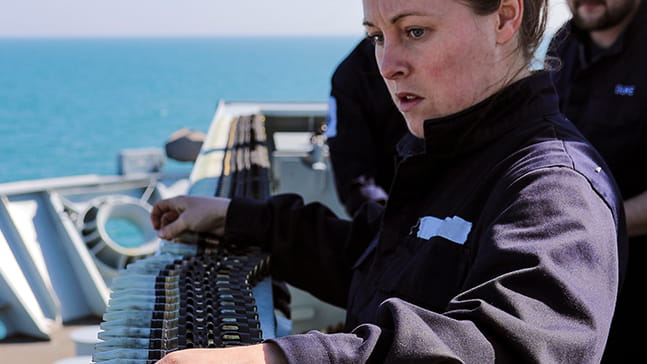Engineering Technician (Weapon Engineering)
You’ll maintain and operate complex communication, detection and weapon systems worth millions of pounds.
- £18,500 - £58,000
- No qualifications
- Surface Fleet
- Engineering
- Rating level
£25,200
£58,000
Zero
Register
6 weeks
Study

I don’t know many jobs where I’d be given responsibility for hundreds of millions of pounds worth of equipment – there’s a lot of trust there. That trust gives you the room to learn and progress really quickly.
Role details
What you’ll do
Being an Engineering Technician (Weapon Engineering) means taking responsibility for the serviceability, readiness and accuracy of systems that make a Royal Navy Ship a Warship. You will be keeping advanced electronic systems, communications, information systems and weapons ready for action anywhere in the world.
Your role
- Take responsibility for the safety of your crewmates, whether that’s identifying a potential threat, or ensuring your ship is able to defend itself.
- Maintain, diagnose and repair complex communications, sensors and weapon systems, guaranteeing missiles, guns and anti-submarine torpedoes are fully operational.
- Get your hands on some of the most sophisticated electronic equipment in existence, working with your team, and under the guidance of the Engineer Officer.
- Complete daily rounds, checking equipment to ensure the ship remains operational, and finding innovative solutions when there’s a problem.
Pay & benefits
- Earn over £25,200 after Basic Training, rising to over £58,000 as your career progresses
- An excellent pension scheme
- Additional pay for each day spent at sea
- Six weeks of paid holiday every year, plus bank holidays
- Free medical and dental care
- Access to superb sport and fitness facilities
- Wide range of benefits including a House Purchase Scheme
- Subsidised travel and accommodation
Skills for life
Qualifications you'll gain
- Attain a Level 2 Apprenticeship in Maritime Mechanical Electrical Mechanic
- Progress to gain a level 3 Apprenticeship in Engineering Maintenance
- Potential to gain a Foundation Degree in Engineering
- Gain specialist vocational qualifications as your career progresses
- Opportunity to study for GCSEs, A-Levels, NVQs or a degree
Skills you'll develop
- Learn how to command, lead and manage
- Streamlined route to registering as EngTech and IEng with the IET
Eligibility
- You must be aged between 16 to 39
- No qualifications are required for this role
- You must be a United Kingdom citizen or British Dual National. Dual Nationality restrictions do apply
- You must have lived in the UK for 5 years continuously prior to application
- A Body Mass Index (BMI) between 18 and 28 (between 17 and 27 if under 18)
Skills & Interests
- Quick thinkers who get things done
- A passion for working with the latest equipment and technology
- Problem-solvers
- Team players and potential leaders
- Physically and mentally fit professionals
Joining Process
From picking your role to starting on your first day, these are the steps you'll take to join as a rating.
Submit an application
Defence Aptitude Assessment (DAA)
You’ll be tested on: Verbal Reasoning, Numerical Reasoning, Work Rate, Spatial Reasoning, Electrical Comprehension and Mechanical Comprehension.
To prepare, you can practise the DAA
Interview
Candidate Preparation Course (CPC)
This four-day induction to life in the Royal Navy, including a Swimming Test and a fitness assessment, is a pass or fail course
Start training
Career Progression
Got a question?
Our virtual recruiter is available to answer your questions 24 hours a day
